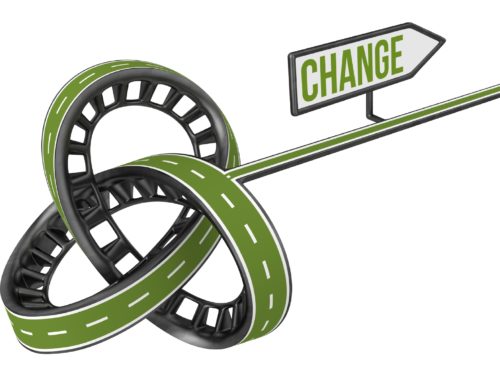The COVID-19 virus has forced everyone into a change that isn’t a choice. This piece about how to respond when change is out of your control is excerpted from Make Change Work (Wiley, 2013).
We all face change that is out of our control at some point. You can view it as a setback, a disappointment, or an opportunity. You can call your response being resilient, bouncing back, or taking advantage of the situation. What you call it doesn’t matter. What matters is your ability to keep moving forward and thrive. How we feel in every situation is determined by how we think about what is happening.
Our task as individuals is to take responsibility for how we think about and ultimately respond to situations that are out of our control. Our job as leaders is to help others do the same.
Let’s Get Personal
How do you respond to change that is outside of your control? Do you consciously think about the reality you could create? Or do you allow circumstances—more specifically the perception you have assigned to those circumstances—to dictate your response?
Ideally, we would all look toward what is possible in the future rather than allowing the past to interpret the present. Dwelling on the present through a destructive lens of past perception does little to help us make proactive, responsible choices about how to respond today.
Most people, however, are very good at doing the thing that most keeps them from a positive response to change—they allow past perception to define how they respond today. There is an adage that past performance is the best predictor of future performance. That happens because most of us are not very good at thinking clearly about the opportunities presented by change.
So What Do I Do?
Breaking old—often lifelong—patterns of how you think about change is extremely difficult. The most important things you can do right now are:
- Slow down and think to separate emotion from response. Give yourself the space and time to react, refresh, and reframe. Make a conscious choice to think from the perspective of how you want to respond rather than how your emotions have conditioned you to respond.
- Acknowledge reality. Sadness, anger, and confusion are responses that extend from our thinking. Acknowledging our feelings as representative of our current thinking is a first step. Using that understanding to re-frame our thinking is true progress.
- Recognize the challenges. In these days of instant everything, it is important to remember that a quick decision to move forward doesn’t minimize the time and effort of doing so.
- Take stock. There is a tendency to feel that everything changes when one aspect of our life changes. Make a list of the things that have and have not changed. Define what is over and what isn’t. An objective look at your resources, options, and reality can help set the stage for positive action.
- Explore a different future. We often define ourselves by our past rather than our potential. Arthritis prevented Anna Mary Robertson Moses from doing the needlework she loved, so she began painting at age 75. Twenty-six years and approximately 1,600 paintings later, Grandma Moses had become one of America’s most acclaimed artists. Take the opportunity to ask new questions that will lead to unique opportunities.
- Take baby steps. Many people thought television personality Deborah Norville was washed up at age 33. She had risen almost overnight to become co-host of NBC’s Today show, and just as quickly, she was gone. Norville became depressed and nonfunctional. Her first step toward regaining control was choosing to get out of bed and take a shower. One shower led to the resolve to do it every day. That turned into getting dressed and going outside. A yearlong stint in radio provided the confidence to retry television, which ultimately led to a revitalized career.3 As the adage goes, “How does an ant eat an elephant? One bite at a time.”
- Celebrate success. We celebrate birthdays, anniversaries, the end of the year, and retirement. So here’s the question: Why wait? Look for every opportunity to celebrate behavior that represents new thinking and moves you toward your new beginning.
We do not always get to choose what happens. We do choose how we think about it, how we handle it, and how we help others do so.
Randy Pennington is an award-winning author, speaker, and leading authority on helping organizations achieve positive results in a world of accelerating change. To bring Randy to your organization or event, visit www.penningtongroup.com , email info@penningtongroup.com, or call 972.980.9857.





